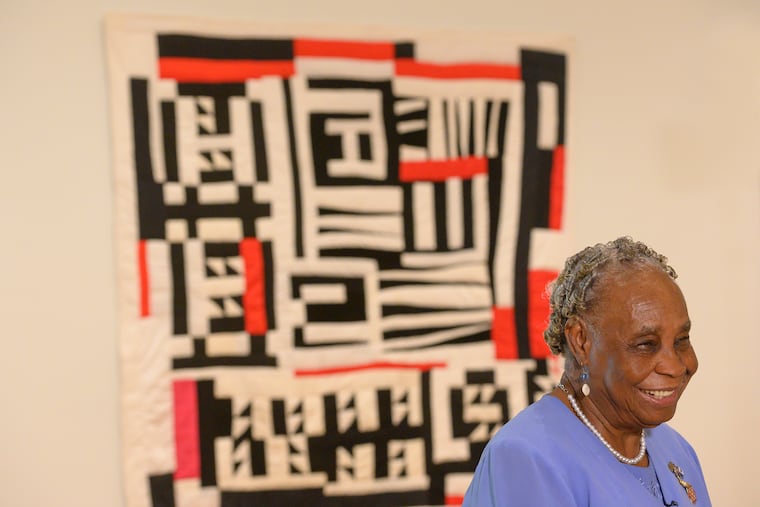Quilts from the American South are on display at the Philadelphia Museum of Art
Works by prominent Gee's Bend quilters and part of a collection newly acquired from the influential Souls Grown Deep Foundation, promoting contemporary African American artists from the South.

Growing up, Essie Bendolph Pettway was used to seeing the vibrant quilts her mother, Mary Lee Bendolph, sewed with the other quilters of Gee’s Bend, Ala., hanging over the cracks in their house to keep the cold winds out in the winter.
“They had to do what they could to keep us warm,” said Pettway, who learned how to quilt as a child from Bendolph. “That’s how we kept warm, by quilts.”
Bendolph’s quilts now hang in art museums around the country, including in the Philadelphia Museum of Art. The museum recently acquired 15 quilts by artists from Gee’s Bend and neighboring towns from the Souls Grown Deep Foundation, an Atlanta-based organization focused on preserving the work of contemporary African American artists in the South.
All 15 are now on display as part of a larger exhibit — “Souls Grown Deep: Artists of the African American South” — that also showcases nine other works acquired from the foundation, including sculptures by Thornton Dial, and assemblages by Lonnie Holley and Bessie Harvey. (The museum first exhibited Gee’s Bend quilts in a 2008 exhibition called “Gee’s Bend: The Architecture of the Quilt.”)
Visitors can view the exhibition through Sept. 2 in the museum’s Perelman Building.
“These works enable us to tell a fuller story about American art,” said John Vick, the Art Museum collections project manager who organized the exhibition. “They bring us into the present by advancing the conversation about who is called an artist and who is represented in art museums.”
The oldest quilts on display were made in the 1920s and 1930s, while the most recent ones were created by Bendolph and her contemporaries in the 2000s. The museum is also showing quilts made during the Freedom Quilting Bee in Rehoboth, Ala., near Gee’s Bend. The Bee was significant because it allowed black women to support their families.
Most of the quilts were made from such salvaged materials as faded denim and cotton corduroy scraps from Sears, Roebuck and Co. But on the walls of the Perelman gallery, they are gorgeous works of art, filled with vivid red circles and bold yellow squares.
“Back in the time [my mom] was coming up, they didn’t have very much,” Pettway said. “Whatever little things they had, like clothes, when they wore out, they had to patch them. And when they could get some more clothes, they took the old clothes and made the quilts to help keep the family warm.”
Bendolph first learned how to quilt from her mother. “I was probably about 5 years old, trying to learn some things about quilts,” she said. “I made a block once and my momma told me, ‘Just like that. That’s good. Try and do another one.’”
Bendolph said that other families in the area used patterns to make their quilts, but her family did not — choosing instead to make “crazy quilts” that don’t follow the rules.
One of Bendolph’s quilts on display at the museum is Blocks, Strips, Strings, and Half Squares. Accompanying it is a related print titled Mama’s Song that was inspired by how her mother used to sing while she sewed quilts. Bendolph conceptualized the design when she was invited to make the print at a fine-art press in California in 2005.
Despite Gee’s Bend’s rich history in quilt making, Pettway said that she’s not sure whether the tradition will continue beyond her generation.
“I grew up under the old people, and in this day and generation, don’t too many young people want to learn or pick up the artwork of quilting,” Pettway said. “Some are doing it now, but not very many. Young people today aren’t very interested in quilts. Now they got everything they need, they don’t know the value of quilts.”
ON EXHIBIT
Souls Grown Deep: Artists of the African American South
Through Sept. 2 at the Philadelphia Museum of Art’s Perelman Building, 2525 Pennsylvania Ave.
Hours: 10 a.m.-5 p.m. Tues.-Sun. (closed Mondays and closed July 4).
Admission: $20, adults; $18, seniors; $14, youth ages 13-18 and students with ID (children under 13 free). Pay what you wish the first Sunday of the month.
Information: 215-763-8100 or philamuseum.org